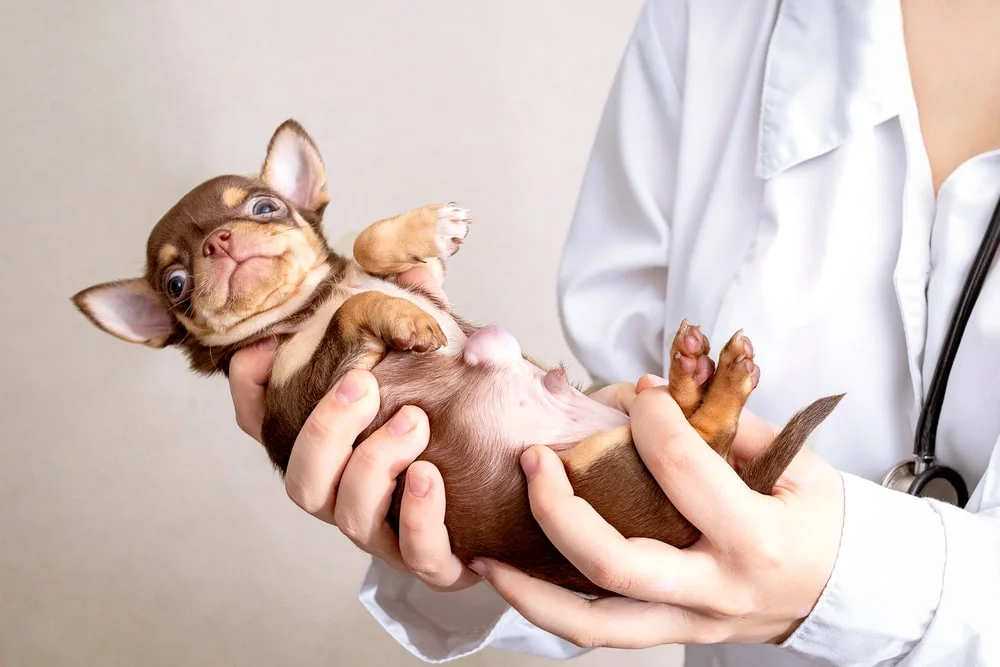PET HEALTH
Hernias in dogs are fairly common. About 90% of hernias are genetic and appear in young puppies. The rest are generally caused by a traumatic injury or straining. Hernias can be painful, and treatment typically requires surgery.1
Dog hernia surgery costs can reach over $2,000, depending on the severity and your dog’s overall health.2 However, dog insurance can help make the cost more affordable. Let’s take a look at what a hernia is, what you can expect from hernia surgery, and some costs dog owners might see on the vet bill.
What Is a Hernia?
A hernia happens when the abdominal muscle wall tears or an opening doesn’t fully close, letting internal organs, tissue, fluids, or blood leak into other parts of the body. A dog hernia after spaying or neutering is possible. In fact, some hernias develop due to improperly healed procedures. Let’s take a look at some of the most common hernias found in dogs.
Diaphragmatic hernia
The diaphragm is the muscle partition in your dog's chest that keeps the abdomen and chest apart. When the diaphragm ruptures, organs and fluids inside the abdominal muscles — like the stomach, liver and intestines — can enter the chest cavity. This can compress the lungs and heart, causing heart and respiratory problems.3
Diaphragmatic hernias mostly occur from blunt force trauma, and congenital types are less common.
Hiatal hernia
The hiatus is the opening in the diaphragm where the esophagus and stomach connect. A hiatal hernia occurs when the muscles around this opening weaken and the stomach protrudes into the chest cavity. It’s similar to a diaphragmatic hernia, but hiatal hernias tend to be congenital more than they’re caused by trauma.4
Umbilical hernia
The umbilicus, or belly button, is where the umbilical cord connects a developing fetus to the mother. After birth, if the umbilical ring doesn’t fully close, it can cause an umbilical hernia. This is when some of the abdominal organs bulge through the unsealed muscle. While this type of hernia usually doesn't pose major health risks, it can be painful.5
Inguinal hernia
The inguinal ring connects the abdomen to the groin area. If this ring is weak and widens, the contents of the abdomen can slip through. This is called an inguinal hernia.6
These can be genetic or acquired with age. Inguinal hernias are often found in intact females, since estrogen may weaken the tissues and pregnancies can stretch the inguinal ring. Certain small breed, male dogs may also be predisposed to congenital inguinal hernias.
Perineal hernia
The perineum is the dog equivalent of a human pelvic floor. It’s the boundary between the anus and scrotum or vulva and keeps the pelvic organs supported. A perineal hernia is when this area weakens or tears, letting the bladder, intestines, or fat through. This kind of hernia mostly happens in older, unneutered male dogs.7
Dog Hernia Symptoms
Dogs with hernias may show a variety of symptoms, which may also depend on the type of hernia. Here are some hernia symptoms dogs may show:1,8
- Visible bulge or swelling
- Difficulty breathing
- Vomiting
- Loss of appetite
- Lethargy
- Fever
- Cramping
- Shortness of breath
- Excessive drooling
Vets may use a visual exam as well as bloodwork, X-rays, and ultrasounds to diagnose the type of hernia your pup has. This can also help them see if there are underlying conditions involved. It’s important to get your dog checked out because severe hernias may lead to tissue death and infection.
Surgery for Hernias in Dogs
Hernias can be reducible or non-reducible. Generally, reducible hernias don’t need surgery because the muscle tissue can be pressed back into place.5 However, your vet may recommend surgery to keep the hernia from recurring.
Most hernias are non-reducible, meaning they’ll need surgery to repair. Once your dog is sedated, your vet will position any herniated organs back where they belong, and then seal the ruptured tissue so it can’t happen again. They may also use a patch or mesh closure to seal larger hernias.7
In more severe cases, your vet may need to perform an emergency thoracentesis to clear the chest cavity of fluids.3 Any other trauma that may have created the hernia or developed as a result of the hernia will also be addressed before the hernia is corrected.
If your dog isn’t spayed or neutered, your vet will likely recommend that procedure before or when they fix the hernia.1 Especially with umbilical hernias, your vet may do both procedures at once. Bundling can help reduce the cost of hernia surgery in dogs.
Hernia treatment costs
Whether your dog needs surgery or the vet can gently press the hernia into place, you’ll still have vet visit expenses. Minor surgery can cost $150, whereas more complicated surgeries could reach over $2,000.2 Your exact hernia treatment cost depends on the complexity of the hernia as well as other factors, including:
- Diagnostic tests
- Anethstesia
- All surgeries performed (if combining with another procedure)
- Overnight hospitalization
- Vet-prescribed medications
- Follow-up appointments
Pet Insurance Could Help Cover Dog Hernia Surgery Costs
Dog insurance may help cover costs associated with treating hernias. Also, MetLife Pet’s optional wellness plan may cover spaying and neutering — which some vets recommend to help prevent hernias.
Wondering if pet insurance is worth it for you? Here’s a story of how MetLife Pet Insurance helped a dog and her pet parents afford hernia surgery. Angel, a Labrador puppy in California, was born with a congenital hernia. Her vet performed surgery to fix it, and the operation cost about $830. Fortunately, the family’s MetLife Pet Insurance policy reimbursed them for nearly $750!9
Are you interested in getting that kind of coverage for your companion and your wallet? Get a free quote today to see your personalized pet insurance rates.

